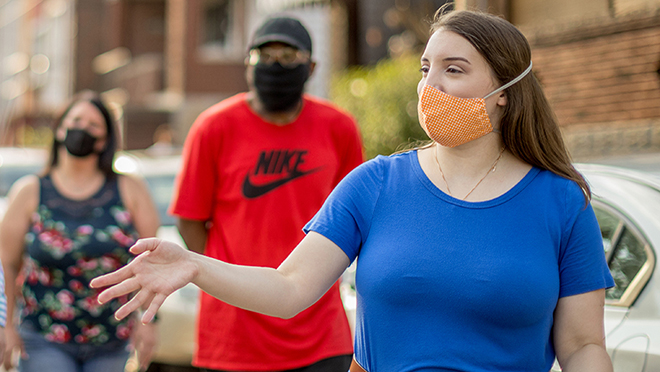Jessica Benham, ’15, chuckles with the lightness of somebody stating the obvious.

“It never occurred to me ever, to hide who I was,” she said of campaigning for political office. “I’d been doing advocacy and activism as the whole person who I was, which meant I was just honest about being bi and autistic.”
In January, Benham was sworn in as a lawmaker in Pennsylvania House of Representatives for the southern portion of Pittsburgh and surrounding areas. Her campaign centered largely around health care and labor issues, both areas of interest forged in her college days. Her campaign also broke barriers as being Pennsylvania’s first autistic representative and the first one open about her bisexuality.
“But I didn’t run for that,” she said from her home office. “I really ran to fight for my community. And I think that narrative of authenticity – ‘yeah, here’s who I am, but the agenda that I have is working for you’ really came through.”
When she moved to Mankato in 2013 to pursue a master’s in communication, Benham was three years into a diagnosis of autism, and that fueled much of her research work at the university. Her thesis, in fact, was titled “Proud to Be Autistic.” She recalls being shocked at how autistic people had little if any roles in research on autism.
“It was interesting to dive into research because so much of the research about autism is not only not conducted by autistic people, it’s not even done with us as an audience in mind,” she said. “It’s written in a way that is framed for doctors, psychiatrists, parents and caregivers. And certainly those are audiences for the research, but there’s always one that seems to be missing, which is the actual people the research is being written about.”
Being upfront about her autism during her campaign – and now as a lawmaker – allows for a shattering of assumptions.
“I think that’s a really exciting thing that I get to talk about. It’s not that autistic people don’t communicate, it’s that we communicate differently. And there’s an oppo0rtunity for us to meet in the middle and build those bridges.”
Benham attended the University after graduating with a communication degree from Bethel College in St. Paul. Of the many reasons she chose Minnesota State Mankato, a memorable one was the chance to coach speech and debate teams.
“I’d been competitive in college on Bethel’s speech and debate team, so the opportunity to coach and pass on some of what I’d learned was really fun.”
Benham lived in Mankato while her husband continued to reside and work in St. Paul. After graduation and moving to Pittsburgh to pursue a Ph.D. in communications. She began taking on advocacy roles—among them founding the non-profit Pittsburgh Center for Autistic Advocacy, an advocacy program for adults with autism—while immersing herself in labor issues and LGBT concerns. She was eventually—perhaps inevitably—approached to run for office.
“I literally laughed in their faces,” she recalled. “I said ‘Oh, yeah, that’s funny. Make fun of the autistic girl, tell her she should run for office. That’s hysterical guys.’ But they meant it. And as that happened over and over again, I began to feel this real call. I think that’s how I conceptualize most of my life, is feeling a call to service. And that has taken on different flavors and different paths. But in this moment it’s about calls to serve my community in elected office.”
From the first mailing on, she was upfront about her diagnosis and her sexuality, neither of which were used against her by opponents. The internet, of course, was a different story.
“Sometimes that’s difficult. Certainly People say mean things on the internet. My favorites are about my teeth. People seem to weirdly like to comment on my teeth. So every once in a while I thank my parents for the braces.”
At only age 30, she plans to legislate from experience on issues of Issues of labor laws, college affordability, health care, LGBT and more—eager to represent for those whose lives are affected adversely by any and all of the above.
“I’ve never hidden who I am in my whole life. Certainly as a bisexual woman who ended up married to a man, it would be easy for me to just step back and say ‘Well, I’m in a straight-passing relationship now, it’s not my problem anymore.’ But I think it is so important for people to see role models who look like them and fight for them. Even if I had the option, I wouldn’t have wanted to pretend to be straight.
“I don’t walk down every street afraid for my life. And there are people in my community who do, and it’s my job to fight for them.”
Her political career may come to a halt if she starts feeling too cozy in the state capitol with its grandeur and opulance.
“The moment that space starts to feel comfortable to me, I need to seek a new career…because that’s a place that’s uncomfortable to me and most people I represent. That’s not built for us. The fact that I feel uncomfortable in that space means that I’m going to fight harder than anyone who thinks they belong there.”
Speak Your Mind